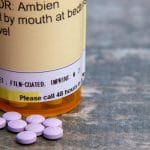Ambien (the brand name for zolpidem) is typically used as a non-benzodiazepine sedative-hypnotic in the short-term treatment of sleep disorders like insomnia.
Like most other drugs, it comes with a variety of side effects that are both common and severe. It also comes with warnings about what shouldn’t be taken with this prescription drug.
Side effects can become more intense if you abuse Ambien and can ultimately become life-threatening if that abuse continues over a long period of time.
Common Side Effects Of Ambien
Whether you have a substance use disorder related to Ambien or you’re taking it as directed, the drug comes with a number of side effects.
The most common include:
- sleepiness
- dizziness
- feeling “drugged” the next day after use
- headache
- lightheadedness
- diarrhea
- memory loss
- dry mouth
- nausea
- constipation
- muscle pain
- confusion
- unusual sleep behaviors like sleepwalking, sleep-driving, or sleep-eating
Severe Side Effects Of Ambien
Ambien can also come with more serious side effects. If you experience severe effects, it’s recommended you see a healthcare professional as soon as possible.
Examples of severe side effects include:
- slow/shallow breathing
- severe drowsiness and dizziness
- rash
- hives
- itching
- swelling of the eyes, face, lips, tongue, or throat
- yellow eyes or skin
- light-colored stools
- vomiting
- pounding heartbeat
- chest pain
- blurred vision
If left untreated, these side effects could quickly become life-threatening. This is especially the case if you’re taking Ambien with another drug.
Ambien Warnings
Ambien drug labels also come with a variety of warnings, including drug interactions, contraindications, and the risk of overdose. Mixing Ambien with other substances increases the risk of severe effects.
Allergic Reactions
Ambien can cause a severe allergic reaction if you’re allergic to any of its ingredients. It can lead to hives, difficulty breathing, and swelling. If you experience any of these, you need to get emergency medical help as soon as possible.
Drug Interactions
There are also quite a few substances that do not react well with Ambien. If you use Ambien as directed or are abusing it, the following drugs can lead to adverse reactions that may be life-threatening. Some react in ways that could lead to an Ambien overdose.
The drugs that shouldn’t be taken with Ambien include:
- alcohol
- marijuana
- over-the-counter cold and allergy medication
- antifungals like ketoconazole
- antidepressants
- rifampin
- St. John’s Wort
- opioid painkillers like codeine and hydrocodone
- drugs for sleep or anxiety such as alprazolam and lorazepam
- muscle relaxants
- antihistamines
Contraindications
There are also a few medical conditions that Ambien use can make worse. If you’re dealing with an Ambien addiction and have one of these medical conditions, seeking addiction treatment may be your best option to ensure the drug doesn’t lead to the worsening of your condition.
The medical conditions that Ambien can worsen include:
- depression and suicidal thoughts
- substance use disorder
- lung disease
- breathing problems
- myasthenia gravis
- sleep apnea
- liver disease
- kidney disease
Ambien use is also not recommended for anyone who is in their last three months of pregnancy as it can lead to drowsiness and breathing problems in the newborn baby. It’s also not recommended for those who are breastfeeding as it can transfer to the baby through breast milk.
Ambien Overdose
When Ambien is taken in high doses or abused in other ways, there is an increased risk of an overdose.
When someone experiences an overdose, you may notice the following signs and symptoms:
- trouble breathing
- extreme drowsiness
- slowed heart rate
- confusion
- cognitive impairment
- loss of consciousness
- coma
Withdrawal Symptoms
Ambien has a relatively low potential for abuse, but can still lead to dependence and addiction. Building up a dependence is what can ultimately lead to withdrawal symptoms if you quit taking the drug.
These symptoms can make it very difficult to quit and can include:
- agitation
- high blood pressure
- fever
- tremors
- stomach cramps
- insomnia
- convulsions
- nausea and vomiting
- uncontrollable crying
- panic attacks
Find Substance Abuse Treatment
If you or a loved one live with Ambien abuse or addiction, please contact Northeast Addictions Treatment Center for information on our outpatient services.
Sources
Written by
Northeast Addition Editorial Team
©2024 Northeast Addition Center | All Rights Reserved
This page does not provide medical advice.



